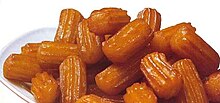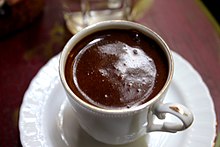Macedonian cuisine

Tavče gravče, the national dish of North Macedonia.
Macedonian cuisine (Macedonian: Македонска кујна, Makedonska kujna), an aspect of Balkan cuisine, is the traditional cuisine of North Macedonia. It reflects Mediterranean and Middle Eastern influences and shares characteristics of other Balkan cuisines. The relatively warm climate of the country provides excellent growth conditions for a variety of vegetables, herbs and fruits. Macedonian cuisine is also noted for the diversity and quality of its dairy products, wines, and local alcoholic beverages, such as rakija.
Tavče gravče and mastika are considered the national dish and drink of North Macedonia.
Contents
1 History
2 Foods
3 Desserts
4 Drinks
4.1 Coffee
4.2 Alcohol
4.3 Non-alcoholic
5 See also
6 References
History
Foods

Turli tava

Prženi lepčinja, a common breakfast

Makalo salad (chili salad mixed of cooked potatoes and red dry pepper)
- Tavče-gravče
- Turli tava
Ajvar, roasted red pepper spread; can be mild or hot- Kebapi
Polneti piperki, stuffed bell peppers; usually filled with rice or rice with meat
Pita (pastry)- Burek
Malidzano, an eggplant spread- Musaka
- Makalo
Pindzur, a spicy vegetable relish
- Popara
- Pastrmajlija
- Sharplaninski ovchi, or kashkaval (hard sheep's milk cheese from the Šar Mountains (Šar planina in Macedonian))
Shirden and kukurek
- Sarma
Kisela zelka and rasolnica (sour cabbage)
Mekici (also known as tiganici or pishii), fried lumps of dough- Chorba od kopriva (creamy nettle soup)
- Kompir mandza (a potato-and-meat stew)
Pleskavica (also sharska and ajducka)
Kachamak (also known as bakadarnik)- Zelnik
Selsko meso is roast beef, pork and lamb with mushrooms, white wine and yellow cheese on top, mostly made in clay pottery- Tarator
Prženi lepčinja, slices of bread covered in beaten egg, then fried
Desserts

Tulumba
- Kadaif
- Med
- Tulumba
- Palačinki (Crêpe)
- Kompot
- Lokum
- Baklava
Drinks
Coffee

Turkish coffee
North Macedonia has a well-developed coffee culture, and Turkish coffee is by far the most popular coffee beverage. With over 5,000 establishments, the traditional South Slavic coffeehouse and bar—the kafeana—is one of the most common places to go out and have a drink. However, because of the negative stereotypes surrounding the kafana, many younger people prefer to frequent the more Western-styled cafés which are also seen as being classier.
From the days of the Ottoman Empire through to the present, coffee has played an important role in the lifestyle and culture of the region. The serving and consumption of coffee has had a profound effect on betrothal and gender customs, political and social interaction, prayer, and hospitality customs. Although many of the rituals are not prevalent in today's society, coffee has remained an integral part of Macedonian culture.
Other coffee beverages such as lattes, cafe mochas and cappuccinos are becoming increasingly popular with the opening of more upmarket cafés. Professionals and businesspeople have contributed to the popularity of instant coffee (especially frappé).
Alcohol

Zlaten Dab (meaning Golden Oak), Macedonian beer produced from 11% beer malt with a content of 4.5% vol. alcohol
Wine
- Vranec
- Traminec
- Alexandria
- Smederevka
Traditionally, white wine would be consumed in the summer, and red wine, in winter.[1]
- Mastika
- Rakija
Beer
- Skopsko
- Krali Marko
- Zlaten Dab
- Gorsko
- Bitolsko
- Kenbach
- Makedonsko
- Starogradsko
Boza, a drink made from millet, traditionally sold by ethnic Albanian vendors.[1]
Non-alcoholic
- Salep
- Yoghurt (Kefir)
Mineral water
- Gorska Voda
- Pelisterka
- Pela Rosa
- Ilina
- Kozuvcanka
- Ladna
See also
- European cuisine
- Cuisine of the Mediterranean
- Eastern European cuisine
References
^ ab Friedman, Victor; Palmer, Veselka (1995), "La cuisine macédonien", in Aufray, Michel; Perret, Michel (eds.), Cuisines d'Orient et d'ailleurs (PDF), Paris: INALCO/Grenoble: Glénant, pp. 76–79.mw-parser-output cite.citation{font-style:inherit}.mw-parser-output .citation q{quotes:"""""""'""'"}.mw-parser-output .citation .cs1-lock-free a{background:url("//upload.wikimedia.org/wikipedia/commons/thumb/6/65/Lock-green.svg/9px-Lock-green.svg.png")no-repeat;background-position:right .1em center}.mw-parser-output .citation .cs1-lock-limited a,.mw-parser-output .citation .cs1-lock-registration a{background:url("//upload.wikimedia.org/wikipedia/commons/thumb/d/d6/Lock-gray-alt-2.svg/9px-Lock-gray-alt-2.svg.png")no-repeat;background-position:right .1em center}.mw-parser-output .citation .cs1-lock-subscription a{background:url("//upload.wikimedia.org/wikipedia/commons/thumb/a/aa/Lock-red-alt-2.svg/9px-Lock-red-alt-2.svg.png")no-repeat;background-position:right .1em center}.mw-parser-output .cs1-subscription,.mw-parser-output .cs1-registration{color:#555}.mw-parser-output .cs1-subscription span,.mw-parser-output .cs1-registration span{border-bottom:1px dotted;cursor:help}.mw-parser-output .cs1-ws-icon a{background:url("//upload.wikimedia.org/wikipedia/commons/thumb/4/4c/Wikisource-logo.svg/12px-Wikisource-logo.svg.png")no-repeat;background-position:right .1em center}.mw-parser-output code.cs1-code{color:inherit;background:inherit;border:inherit;padding:inherit}.mw-parser-output .cs1-hidden-error{display:none;font-size:100%}.mw-parser-output .cs1-visible-error{font-size:100%}.mw-parser-output .cs1-maint{display:none;color:#33aa33;margin-left:0.3em}.mw-parser-output .cs1-subscription,.mw-parser-output .cs1-registration,.mw-parser-output .cs1-format{font-size:95%}.mw-parser-output .cs1-kern-left,.mw-parser-output .cs1-kern-wl-left{padding-left:0.2em}.mw-parser-output .cs1-kern-right,.mw-parser-output .cs1-kern-wl-right{padding-right:0.2em}


